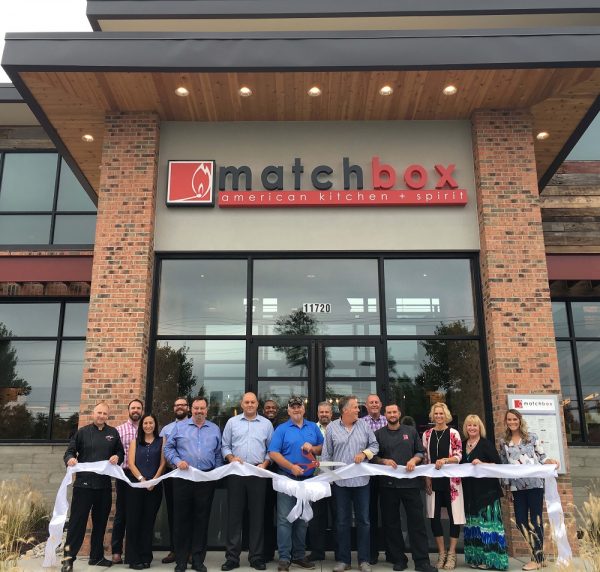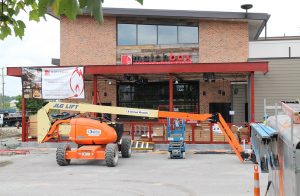
Matchbox team members celebrate the opening of Matchbox’s grand opening in September 2016. (Matchbox)
It’s lights out for a Washington, D.C.-based restaurant chain’s lone Richmond-area location.
Matchbox American Kitchen + Spirits abruptly ceased operations this week at its Short Pump restaurant at 11720 W. Broad St., less than three years after it built the outpost from scratch.
A spokeswoman representing the chain confirmed the closure in an email Tuesday afternoon, saying, “Matchbox made the difficult decision to close its Short Pump location and refocus its attention on expansion within the DMV region, including new locations in Northern Virginia.”
Ty Neal, one of the founders and owners of Matchbox, did not return a call or email for comment.
Matchbox maintains nine restaurants in the greater Washington, D.C. area, including a new restaurant set to open in D.C.’s Penn Quarter neighborhood. It also owns additional outposts in Texas and Florida.
The company first opened its two-story, 7,000-square-foot Short Pump restaurant in September 2016 on a prominent outparcel once occupied by Chili’s near the entryway to Short Pump Town Center.
Matchbox leased the property from the group that owns the mall, consisting of Australia-based investment firm QIC and local developer Pruitt Associates.
Short Pump Town Center General Manager Kem Blue said in an email Tuesday that the ownership group is working to fill the shuttered building, although he would not discuss specifics.
“We will replace Matchbox with a new and different concept that will complement and enhance our current merchandise mix,” Blue said.

Matchbox team members celebrate the opening of Matchbox’s grand opening in September 2016. (Matchbox)
It’s lights out for a Washington, D.C.-based restaurant chain’s lone Richmond-area location.
Matchbox American Kitchen + Spirits abruptly ceased operations this week at its Short Pump restaurant at 11720 W. Broad St., less than three years after it built the outpost from scratch.
A spokeswoman representing the chain confirmed the closure in an email Tuesday afternoon, saying, “Matchbox made the difficult decision to close its Short Pump location and refocus its attention on expansion within the DMV region, including new locations in Northern Virginia.”
Ty Neal, one of the founders and owners of Matchbox, did not return a call or email for comment.
Matchbox maintains nine restaurants in the greater Washington, D.C. area, including a new restaurant set to open in D.C.’s Penn Quarter neighborhood. It also owns additional outposts in Texas and Florida.
The company first opened its two-story, 7,000-square-foot Short Pump restaurant in September 2016 on a prominent outparcel once occupied by Chili’s near the entryway to Short Pump Town Center.
Matchbox leased the property from the group that owns the mall, consisting of Australia-based investment firm QIC and local developer Pruitt Associates.
Short Pump Town Center General Manager Kem Blue said in an email Tuesday that the ownership group is working to fill the shuttered building, although he would not discuss specifics.
“We will replace Matchbox with a new and different concept that will complement and enhance our current merchandise mix,” Blue said.




Macados would do well in that location or somewhere close by in the Short Pump area. With Matchbox, quality of food and service were great, but prices seemed to be too high for this market. The graveyard of shuttered Short Pump restaurants continues to grow.
Never went there but after I saw they had closed I got on YELP to read what people had to say about the place. The presence of flies seems to have been a consistent theme of many of the written reviews.
So in Short Pump we’ve lost Kona, Carolina Ale House, Matchbox., and the sushi place near the Petsmart.
Restaurant instability is not really a good indicator of the stability of a local economy but more a fact of life. Restaurants are a notoriously unstable industry and easily come and go. I don’t think losing 4 places in a multiple mile stretch of commercial is really anything to worry about. There are still many more options for people to go and spend their money on.
From the outset I indicated that the economics didn’t make sense for Matchbox. They demolished an existing Chili’s, built an expensive building, with limited seating, due to the design, and were paying rent to the mall. The cost of amortizing the construction costs, loan interest included, paying rent, taxes, and high common area charges, since the property is part of the Town Center, meant that they had to do really big numbers with regard to sales.
This , in my opinion, was a major management error from the get go. Hopefully they will avoid this in the future.